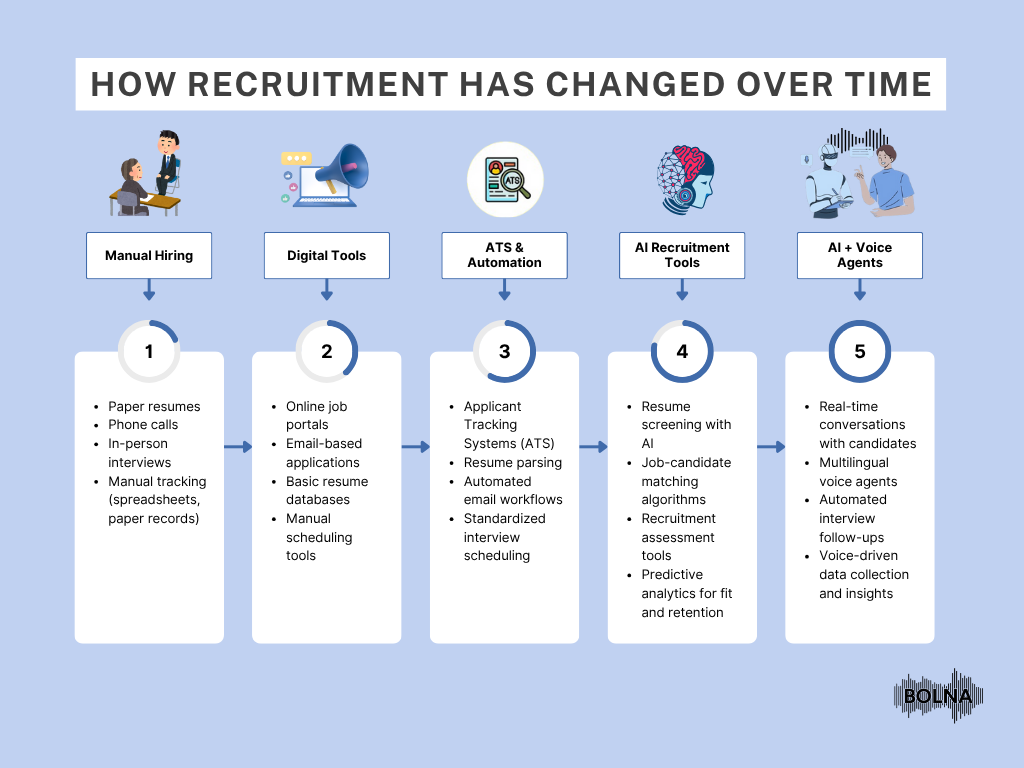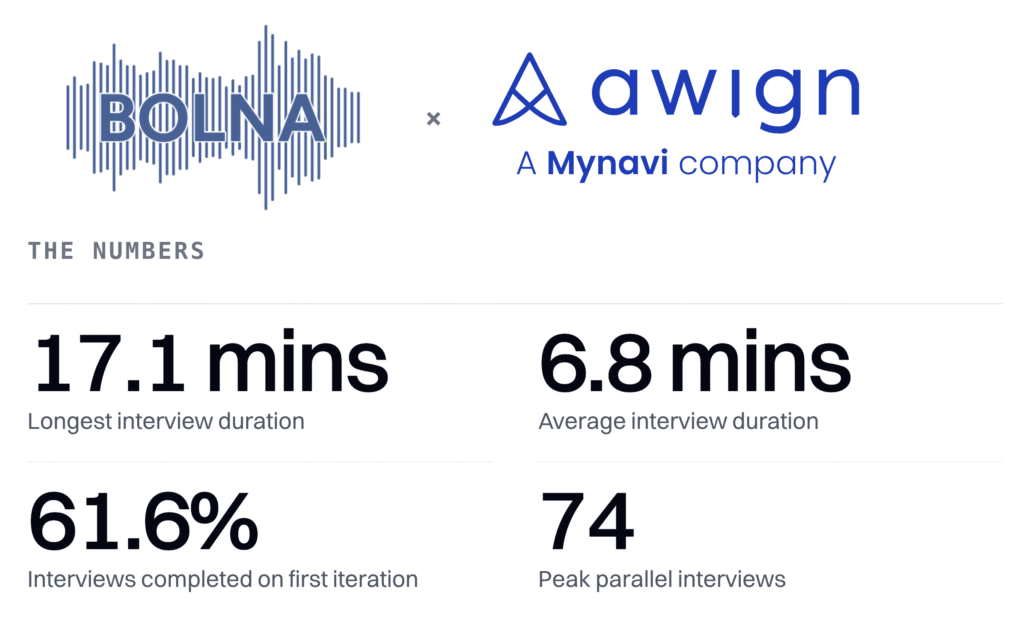Hiring skilled people is one of the biggest challenges tech startups face. The demand for software engineers, data scientists, and product experts keeps growing, but there are not enough qualified candidates available. According to the 2025 Talent Shortage Report by ManpowerGroup, 74% of employers around the world say they struggle to find the skilled people they need. For startups, this problem feels even harder.
Every new hire can make a big difference to a startup. The right person can help build new products, speed up development, and push the company forward. But hiring the wrong person or taking too long to fill a role can slow progress and hold the company back. Traditional hiring methods often feel too slow for the fast pace of startups.
This is why AI recruitment in tech startups is becoming important. AI tools help companies handle repetitive tasks, review candidates faster, and make decisions based on data. They also improve the hiring experience for candidates and reduce human bias. With the right tools, startups can hire better people more quickly and compete with bigger companies.
In this article, we will look at the hiring challenges startups face. We will also explain how AI helps solve those problems and how you can use it in your hiring process.
Table of Contents
Understanding the Hiring Challenges Faced by Tech Startups
Hiring the right people is one of the toughest jobs for any tech startups. These companies grow quickly but often work with small budgets and limited teams. They need skilled developers, data experts, and product specialists who can adapt fast and solve real problems. Finding such talent is not easy.

The shortage of skilled professionals is a major challenge. Big tech companies attract most candidates with higher pay, better benefits, and stronger brand names. Startups often lose good candidates before they can even make an offer. Limited hiring resources add to the problem. Many startups do not have dedicated HR teams, so founders or small teams manage recruitment along with other tasks. This makes the process slow and increases the risk of poor hiring decisions.
Time pressure makes things harder. Startups need people quickly to keep up with product goals and growth plans. They must also find candidates who match their work culture. These challenges show why many companies now explore AI recruitment in tech startups to improve how they hire.
Why Traditional Hiring Holds Startups Back
For decades, hiring has followed the same pattern. Recruiters post jobs, wait for applications, read resumes, and schedule interviews manually. These steps work, but they are slow and often fail to match the pace startups need. A single role can take weeks to fill, and by then, skilled candidates may have accepted other offers.
Startups feel this challenge more than anyone. Their teams are small, deadlines are tight, and every new hire matters. The talent shortage is growing, competition is rising, and hiring demands are changing faster than before. Traditional methods alone can’t keep up. That is why many companies are now turning to AI-powered hiring tools and AI agents are becoming a key part of this shift.

The Role of AI Agents in Modern Hiring
AI agents are reshaping how companies find and hire talent. They handle many time-consuming tasks that once depended entirely on human effort. In AI recruitment in tech startups, these agents improve how companies communicate with candidates, review profiles, and manage interview schedules.
There are several types of AI agents built to support different stages of hiring. Chat agents guide candidates through applications and answer questions instantly. Screening agents analyse resumes and shortlist candidates based on skills and experience. Scheduling agents organise interviews and send reminders without manual work.
Among all types, voice AI agents are having the biggest impact. They allow candidates to speak naturally, ask questions, and book interviews without delays. They operate 24/7 and respond immediately, which keeps candidates engaged and reduces drop-offs.
Platforms like Bolna bring a more advanced layer to this. Bolna’s voice AI agent goes beyond simple question-and-answer interactions. It understands context, remembers past conversations, and adapts future responses for a more human-like experience.
It can be customized for startup needs, easy to use, scalable, and capable of integrating with popular hiring platforms like Workday, making adoption seamless. This integration helps teams manage candidate data and communication in one place. By handling communication intelligently, voice AI agents like Bolna give recruiters more time to focus on interviews, team fit, and final decisions.
Key Benefits of AI Recruitment for Tech Startups
AI recruitment for tech startups brings speed, clarity, and smarter decision-making to hiring. It helps small teams compete with larger companies while improving the experience for both recruiters and candidates. Here are some of the most valuable benefits tech startups are seeing today:
- Faster access to top talent: AI reduces the time spent on manual tasks like resume screening, interview scheduling, and follow-ups, helping startups connect with skilled candidates before competitors do.
- Better hiring decisions with real insights: AI analyses skills, experience, and past performance to highlight the most suitable candidates, reducing guesswork and improving the quality of hires.
- Improved candidate engagement: Voice AI agents like Bolna keep candidates informed at every stage by answering questions, sharing updates, and sending follow-ups, which builds trust and keeps them interested.
- Support for growing hiring needs: AI tools scale as startups grow, managing large volumes of applications while maintaining strong communication and delivering useful insights.
- Seamless coordination with existing platforms: Solutions like Bolna integrate with tools such as Workday, ATS platforms, and calendars, keeping candidate data organised and ensuring every stage of hiring moves forward smoothly.
Real-World Examples of AI Recruitment in Tech Startups
Awign, one of India’s largest work-as-a-service platforms, needed to hire fast across different roles. The company received thousands of applications every week, but its small recruitment team struggled to review profiles, schedule interviews, and keep candidates engaged. Manual processes led to delays, missed opportunities, and higher hiring costs.
Bolna’s voice AI agent helped Awign change how it handled hiring tasks. The AI system spoke directly with candidates, answered their questions, scheduled interviews, and collected structured feedback from conversations. It also integrated with Awign’s existing hiring platforms, so candidate data stayed organised and updated without extra effort from the team.

The results were significant. Awign reduced screening and interview scheduling time, cut hiring costs by about 65%, and improved candidate response rates. Many applicants who had stopped engaging rejoined the process after receiving timely voice follow-ups. The voice AI agent also supported interviews in multiple languages, which helped Awign connect with a larger talent pool.
This example shows how AI recruitment in tech startups can solve real hiring challenges. With tools like Bolna, even small teams can handle large candidate volumes, improve communication, and focus on selecting the best talent.
How to Choose the Right AI Recruitment Tool for Your Startup
Not every AI tool will suit your startup’s hiring needs. Choosing the right one means thinking about your goals, team size, budget, and how you hire. Here are some key points to consider before making a decision:
- Match the tool to your hiring goals: Identify the biggest problems you want AI to solve, such as resume screening, interview coordination, or candidate engagement. Choose a platform that focuses on those specific areas.
- Check how well it fits your current systems: The tool should work with platforms you already use, such as Workday or your applicant tracking system. This keeps data connected and ensures nothing is lost between steps.
- Look for easy setup and use: A good AI recruitment tool should be simple to start with and not require heavy technical support. Your team should be able to use it without long training sessions.
- Focus on candidate experience: Tools like Bolna use voice AI to make interactions natural and responsive. This improves communication and keeps candidates interested throughout the hiring process.
- Think about long-term growth: Choose a tool that can handle more candidates as your startup grows. A scalable platform helps you avoid switching tools too often and keeps your hiring process consistent.
The Future of AI Recruitment in Tech Startups
AI recruitment in tech startups is evolving quickly and will shape how companies hire in the coming years. Future tools will go beyond automation by analysing past hiring data to predict candidate success and support better decision-making. Communication will also improve, with AI systems adapting conversations based on candidate preferences and past interactions.
Among these changes, voice AI will have a prominent future. It will guide candidates through every stage of hiring, provide instant answers, and offer a natural, human-like experience that keeps them engaged. Platforms like Bolna are leading this shift by building voice AI agents that understand context, personalise conversations, and manage large candidate volumes with ease.
As AI recruitment in tech startups grows, companies that adopt voice-driven tools early will be in a stronger position to attract, engage, and retain top talent in a highly competitive market.
Conclusion
Hiring has always been a challenge for startups, and traditional methods often fall short when speed and accuracy matter most. AI recruitment in tech startups offers a practical way to solve these challenges by reducing manual work, improving decision-making, and creating better experiences for candidates. Voice AI plays an important role here by making interactions faster, more natural, and more engaging for applicants.
You can get started with Bolna Pilots, which include 800 free minutes and a ready-to-use agent that goes live in just one day. From there, you can see the platform in action through a live demo, explore the API documentation, or speak directly with our engineers to understand how enterprise Voice AI on-prem fits into your systems.
1. What is AI recruitment in tech startups?
AI recruitment in tech startups refers to the use of artificial intelligence to handle different parts of the hiring process, such as screening resumes, shortlisting candidates, scheduling interviews, and analysing data to support better hiring decisions.
2. How does voice AI improve the hiring process?
Voice AI plays an important role in AI recruitment in tech startups by creating natural conversations with candidates. It answers questions, schedules interviews, and sends follow-ups automatically, which improves communication and keeps candidates engaged.
3. Can AI tools replace human recruiters?
No. AI tools do not replace recruiters. They support AI recruitment in tech startups by automating repetitive tasks and providing data insights, while human recruiters focus on interviews, assessing cultural fit, and making final decisions.
4. Are these tools suitable for small companies?
Yes. AI recruitment in tech startups is especially useful for smaller teams with limited resources. Most tools are easy to set up, scalable, and cost-effective, making them ideal for startups that want to improve their hiring process.
5. How quickly can I start using a voice AI recruitment tool?
Platforms like Bolna can be set up in as little as one day. Startups can test them through pilot programs, explore demos, and integrate voice AI into their workflows without complicated technical steps.